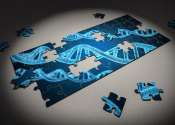How ApoE4 endangers the brain
Apolipoprotein E (ApoE) is kind of like a delivery service for the human brain. It supplies neurons with important nutrients, including with polyunsaturated fatty acids—which are building blocks of the membranes surrounding ...
Jun 26, 2020
0
438








